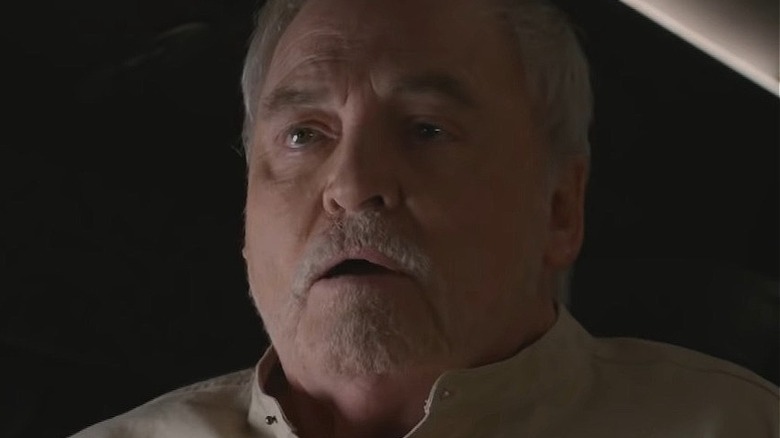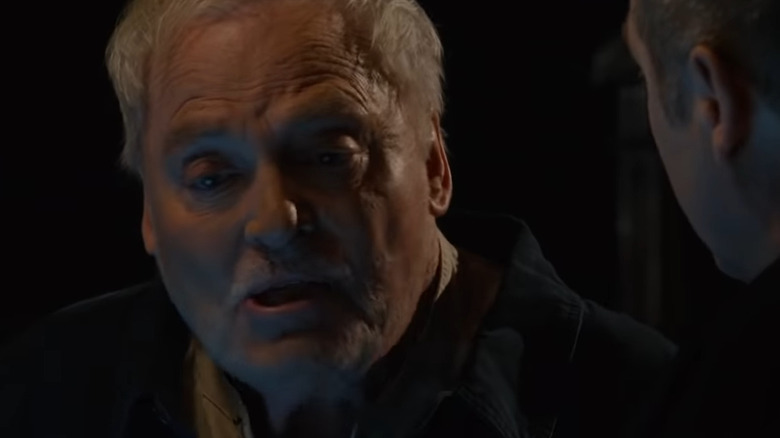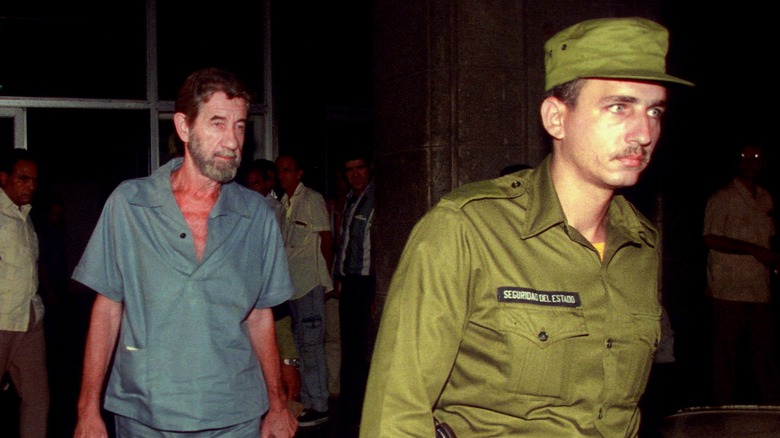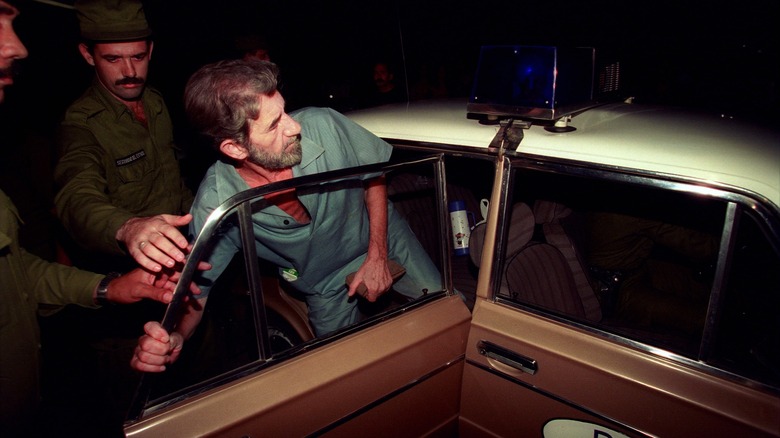The Blacklist's Robert Vesco Was Based On A Real-Life Conman
There's no denying the popularity and magnetism of crime shows; there's a reason why so many different ones are on the air, and why no one is able to stop themselves from sitting down to watch them at any chance they get. The interest in crime shows seems to increase further when there's a touch of real life behind the villains or behind the heroic detectives. It also keeps things fresh; how many plotlines can you come up with before you become bored, stuck, or feel like you're repeating what you've already said? Real-life inspiration undeniably makes things more compelling.
Take, for instance, "The Blacklist." The premise alone is promising; longtime wanted fugitive Raymond "Red" Reddington (James Spader turns himself in, promising to help the FBI take down criminals he's worked with in his past. One such was Robert Vesco (Stacy Keach), who stands out from the rest.
Vesco, who was introduced in Season 6, Episode 13, was reunited with Red, his former apprentice. Red's crew, made up of Liz Keen (Megan Boone), Donald Ressler (Diego Klattenhoff), and Aram (Amir Arison), likewise got to know his old mentor, who was believed to be dead.
Not only is Vesco not dead, and not reformed as he tries to make Red believe, but he's based on a real person. Robert Vesco was a real criminal, and much of his life was pulled onto the show to build the character responsible for introducing Red to the crime world.
The Robert Vesco on The Blacklist
Stacy Keach portrays Vesco twice in the series; once in Season 6 and again in Season 9. In Season 6, he and Red hatch a plan to retrieve the treasure from The Ballad of the De La Cruz, which now resides in the New Orleans opera house. Vesco is at first feeling unprepared to pull off such a complicated heist on short notice, but Red reminds him of his prowess: "Rediscover that dapper rascal whose charm and wit could deceive even the very best of us."
They are successful, and Red at first trusts that Vesco has been reborn; Vesco seems reluctant to retrieve the fortune, claiming he has realized he can achieve happiness without wealth. This is all a façade, of course, as after Red promises the funds to Liz and the FBI for charity, he opens the truck with the treasure to find that Vesco has stolen all of its contents.
In Season 9, Vesco returns as the leader of a religious cult that steals valuable religious artifacts. His followers think they are destroying them; in reality, Vesco turns around and sells them on the black market for millions. The cult is disbanded when Red exposes him to his followers and rogue members attempt to bomb a church. Vesco is ultimately captured once and for all when fan-favorite Dembe Zuma (Hisham Tawfiq) reminds Red of the damage Vesco has done. Red tries to appeal, but finally relents and Vesco is arrested.
Separations and similarities between the fictional and real Vesco
While there are some similarities between Stacy Keach's portrayal and the real-life Robert Vesco, some pretty substantial differences remain. For one, Vesco was never fully incarcerated by the FBI like Keach's counterpart on "The Blacklist"; he was incarcerated in Cuba for insurrections there, but never spent time imprisoned for his crimes in the United States. The real Vesco also never had any relation to a cult, religious or otherwise, and The Supremo Priori Knighthood was a fictional cult created for the show.
One of the most important separations to note is that Vesco never actually mentored another high-profile criminal. Whitey Bulger, the criminal that inspired "The Blacklist" and the character Raymond Reddington (via Deadline), never had any affiliation or real-life ties with Vesco. Bulger never left the country (via A&E), while Vesco fled to Costa Rica early in the '70s, which means they never had the opportunity to meet.
For similarities, Vesco did illegally donate funds to Richard Nixon's campaign, just as his fictional counterpart did on the show. The most important similarity, however, happens to be the most interesting — while Red thinks his mentor died and discovers that his death was faked, the real Vesco is also believed to have faked his death. He was said to have passed from lung cancer at a hospital in Cuba back in 2007, but no public records in Cuba or America were made that Vesco had died, according to an article from The New York Times.
Dead or alive, the real Vesco still remains an enigma today
As noted by The New York Times, there are people close to Robert Vesco who believe that he might have tried to evade justice again by faking his death. In an article by The Guardian, the outlet detailed how Nicaragua offered Vesco refuge, similar to how other nations such as the Bahamas, Antigua, and Cuba admired Vesco for the potential that he could bring wealth to their country. Nicaragua went further and gave him a false name, "Tom Adams," for him to use safely; this could only be one of the aliases Vesco used. If the conman lived off a fake name once, who knows how many other times he did and if perhaps he's still doing it?
He was able to lie low when he went to Costa Rica. According to The New York Times, he blended in by investing in a number of tech-related ventures and by working as a dairy and cattle rancher in the Central American country.
With a reputation such as his, there's a chance Robert Vesco, if he is still alive, would be extremely proud to have a character based on him on TV, especially on a show as well enjoyed as NBC's "The Blacklist."



